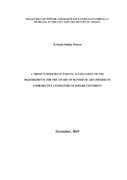| dc.contributor.author | Wekesa, Inviolata Naliaka | |
| dc.date.accessioned | 2019-12-02T12:20:36Z | |
| dc.date.available | 2019-12-02T12:20:36Z | |
| dc.date.issued | 2019-11 | |
| dc.identifier.uri | http://erepository.kibu.ac.ke/handle/123456789/1864 | |
| dc.description.abstract | This study is an examination of dialectics of power acquisition, maintenance
and resistance as depicted in Francis Imbuga’s two selected plays. The study
addresses literature as a mirror of the society in relation to power discourses.
The objectives of the study are: to investigate Imbuga’s use of characters to
show how power is acquired and maintained in his two plays, to establish how
Imbuga uses characters to resist power through diversified dialectical
approaches and to examine the language use by Imbuga to dramatize the power
discourses in Betrayal in the City and The Return of Mgofu. This study is guided
by Karl Marx’s theory of Marxism particularly the strand of Dialectical
materialism and revolution. Marxism theory is used to help explain power
discourses in the society as portrayed by the playwright and also to establish the
force behind the playwright that makes him present his ideas in the manner he
does in the selected texts. The study is complemented with Sigmund Freud’s
Psychoanalysis Theory to help explain and analyze Imbuga’s diversified
approaches to power discourses and the forms of resistance used in his works
of art. The study is qualitative in nature that entails close reading and analysis
of texts. The two texts, Betrayal in The City and The Return of Mgofu written in
a span of about 35 years are selected to help investigate and identify the trend
in Imbuga’s approach to power discourses in society. The major findings of this
study are the shift in leadership from the concentration of power among
individuals to council leadership, careful use of literary language is a safe means
of addressing societal ills without brushing state harassment and the most
appropriate approaches of resisting power is inclusion and use of diplomacy.
This study is significant as it may be used to address the power obsession
problems among African leaders who cling to power; which in turn lead to
protests from the masses and civil strife in their countries. It is noted that
Dialectical materialism and revolution strand of Marxism is the most
appropriate way of negotiating for space in a highly polarized society. This is
because those in authority do not feel directly attacked as compared to other
Marxist approaches. This study can be used to recommend that literary artists
should embrace Imbuga’s way of enlightening society by applying Marx strand
of Dialectical materialism and revolution. This does not take leaders head on
while cautioning the use of other strands of Marxism that are likely to cause
more destruction of life, property and the general disintegration of society.
Similarly, it recommends that writers should embrace literary language aspects
that avoid direct confrontations with the authorities like the use of Horatian
satire that Imbuga uniquely uses to achieve his objectives. | en_US |
| dc.language.iso | en | en_US |
| dc.publisher | KIBU | en_US |
| dc.rights | Attribution-NonCommercial-ShareAlike 3.0 United States | * |
| dc.rights.uri | http://creativecommons.org/licenses/by-nc-sa/3.0/us/ | * |
| dc.title | Dialectics of power and resistance in Francis Imbuga’s betrayal in the city and the return of Mgofu | en_US |
| dc.type | Thesis | en_US |

